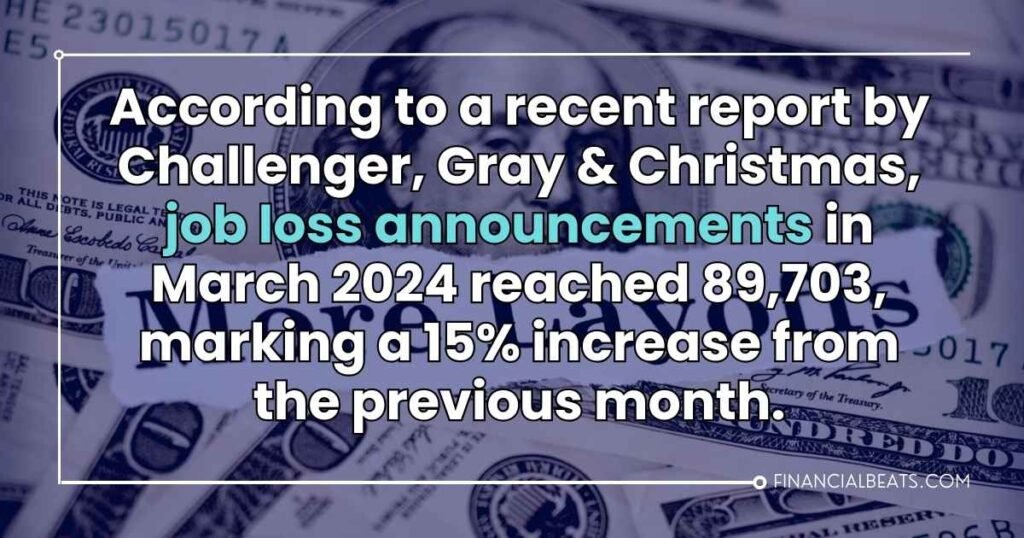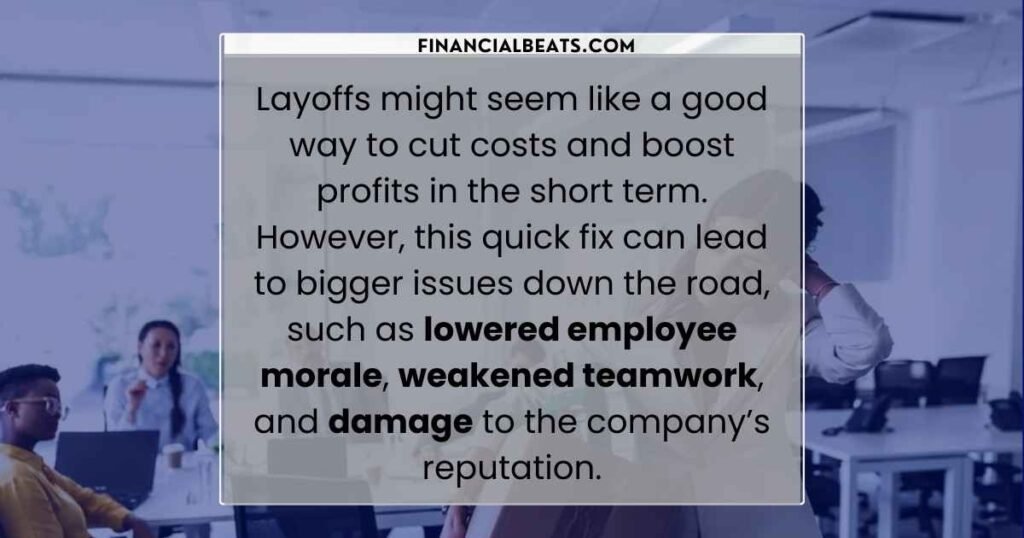Tech companies are seeing a significant surge in financial layoffs among giants in 2024 compared to 2023. This rise is driven by a shaky global economy and slower revenue growth across the industry.
This trend shows that tech companies are under growing pressure to deal with economic challenges like higher interest rates and inflation. These factors are making it harder for them to keep up the growth and profits they had before.
The Scale of Layoffs

The wave of layoffs in the tech industry can be traced back to the hiring surge during the pandemic. As lockdowns pushed more people towards remote work and online shopping, tech companies expanded rapidly to meet the increased demand. However, as the economy has cooled and revenues have declined, these companies now face significant challenges.
After a period of aggressive job growth, the trend has sharply reversed. In March 2024, job additions were far below expectations, signaling that efforts to control inflation might also be slowing job creation. This downturn has been particularly severe in the tech sector, where companies like Amazon, Cisco, Meta, Microsoft, Google, IBM, SAP, and Salesforce, along with numerous smaller firms, have all announced large-scale layoffs.
According to a recent report by Challenger, Gray & Christmas, job loss announcements in March 2024 reached 89,703, marking a 15% increase from the previous month.
This troubling trend is compounded by broader economic issues such as supply chain disruptions, persistent inflation, and the ongoing conflict in Ukraine. These factors are driving both companies and consumers to tighten their spending, heightening fears of a potential recession.
The cumulative effect of these challenges has led to more people seeking unemployment assistance than experts had predicted, further underscoring the economic strain many are feeling
Immediate Impact of Layoffs

When people lose their jobs, they feel the impact right away, especially those who have been in their careers for a long time. It’s not just about feeling sad; it can also lead to financial problems if they can’t quickly find a new job.
For companies, layoffs might seem like a good way to cut costs and boost profits in the short term. However, this quick fix can lead to bigger issues down the road, such as lowered employee morale, weakened teamwork, and damage to the company’s reputation.
When a company lays off a large number of employees, it can create future problems. Those who remain may feel insecure and unhappy, which can reduce productivity and lead to more employees quitting.
Layoffs can also harm a company’s image, especially if it looks like the company doesn’t care about its workers. This can make it harder to attract and keep top talent, ultimately hurting the company’s growth and success in the long run.
Financial Layoff Timeline of Tech Giants
January 2024
- Meta cuts 5,000 jobs, continuing its focus on efficiency and cost reduction. This was part of a broader restructuring that began in late 2023.
February 2024
- Electronic Arts (EA): 670 jobs eliminated, equivalent to 5% of its workforce, as the company seeks to streamline operations.
- Sony PlayStation: 900 employees laid off, which is about 8% of the division’s workforce.
- Expedia: 1,500 roles cut within its Product & Technology division as part of a shift in operational focus.
March 2024
- Meta announces an additional 10,000 layoffs, bringing the total cuts to 15,000 in just the first quarter of 2024, continuing its extensive cost-cutting strategy initiated in 2023.
April 2024
- Amazon cuts 9,000 jobs due to declining revenue growth and the need to rebalance its workforce amid changing market conditions.
June 2024
- Microsoft lays off around 1,000 employees, focusing on roles in the mixed reality and Azure divisions as it realigns its business strategy towards more profitable areas.
July 2024
- Intel: Announces a massive layoff of 15,000 employees, representing 15% of its global workforce, as part of a $10 billion cost-reduction plan aimed at improving profitability amidst disappointing revenue growth.
- UKG: Cuts 2,200 jobs, about 14% of its workforce, in an effort to concentrate on key growth areas and bolster long-term strategic goals.
August 2024
- Infineon: 1,400 jobs cut globally, with additional roles being relocated to countries with lower labor costs to optimize expenses.
- Dell: Conducts unspecified layoffs as it restructures its business to focus more on AI and other emerging technologies, although the exact number of jobs affected has not been disclosed.
Reducing the Impact of Financial Layoffs

While layoffs may be unavoidable in certain situations, companies can take proactive steps to mitigate their impact. Offering outplacement services can be an effective way to help laid-off employees transition into new roles more quickly, easing their financial burden and reducing the stress associated with job loss.
Transparency is also key during layoffs. By openly communicating with employees about the reasons behind the layoffs and the company’s plans, employers can reduce uncertainty and foster a more supportive work environment, even in challenging times.
Moreover, investing in training programs can build a more resilient and adaptable workforce. By helping current employees develop new skills and stay up-to-date with market changes, companies can prepare them for future roles and reduce the likelihood of future layoffs. This approach not only benefits employees but also strengthens the company’s ability to navigate economic challenges and remain competitive in a rapidly changing landscape.
Focus and Toughen Up!
Layoffs are tough but common in finance. While they can help companies save money in the short term, they often lead to long-term problems like low employee morale and loss of experience. To lessen these effects, companies should focus on supporting their workers, being transparent, and investing in training. This can help build a stronger, more positive workplace that’s better equipped to face future challenges.
FAQs
Why are tech giants experiencing massive financial layoffs in 2024?
Tech giants are facing large-scale layoffs in 2024 due to economic uncertainty, rising interest rates, and slower revenue growth. Many companies over-hired during the post-pandemic boom, and the increasing adoption of AI and automation has led to further reductions as businesses seek cost efficiency.
Which tech companies have been most affected by layoffs in 2024?
Major companies like Meta, Amazon, Intel, Microsoft, and Google have been heavily impacted, with each laying off thousands of employees. Smaller tech firms and startups are also feeling the strain, struggling to adapt to the challenging economic environment.
How are these financial layoffs impacting the tech giants and its workforce?
These layoffs are causing financial stress and job insecurity among workers, leading to a more competitive job market. The industry is shifting towards greater efficiency and automation, potentially reducing long-term job opportunities but also creating a demand for new skills in emerging tech fields.
What steps can companies take to reduce the impact of these layoffs on their employees?
Companies can mitigate the impact by offering outplacement services, maintaining transparency during the process, and investing in training programs to help remaining employees adapt to new technologies and market demands.
